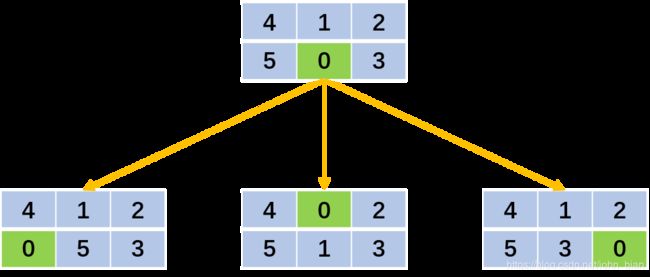LeetCode#773滑动谜题
@author: sdubrz
@date: 2020.05.26
题号: 773
题目难度: 困难
考察内容: BFS
原题链接 https://leetcode-cn.com/problems/sliding-puzzle/
题目的著作权归领扣网络所有,商业转载请联系官方授权,非商业转载请注明出处。
解题代码转载请联系 lwyz521604#163.com
在一个 2 x 3 的板上(board)有 5 块砖瓦,用数字 1~5 来表示, 以及一块空缺用 0 来表示.
一次移动定义为选择 0 与一个相邻的数字(上下左右)进行交换.
最终当板 board 的结果是 [[1,2,3],[4,5,0]] 谜板被解开。
给出一个谜板的初始状态,返回最少可以通过多少次移动解开谜板,如果不能解开谜板,则返回 -1 。
示例:
输入:board = [[1,2,3],[4,0,5]]
输出:1
解释:交换 0 和 5 ,1 步完成
输入:board = [[1,2,3],[5,4,0]]
输出:-1
解释:没有办法完成谜板
输入:board = [[4,1,2],[5,0,3]]
输出:5
解释:
最少完成谜板的最少移动次数是 5 ,
一种移动路径:
尚未移动: [[4,1,2],[5,0,3]]
移动 1 次: [[4,1,2],[0,5,3]]
移动 2 次: [[0,1,2],[4,5,3]]
移动 3 次: [[1,0,2],[4,5,3]]
移动 4 次: [[1,2,0],[4,5,3]]
移动 5 次: [[1,2,3],[4,5,0]]
输入:board = [[3,2,4],[1,5,0]]
输出:14
提示:
- board 是一个如上所述的 2 x 3 的数组.
- board[i][j] 是一个 [0, 1, 2, 3, 4, 5] 的排列.
通过次数2,667 提交次数4,553
BFS解法
一般这种状态变换的最小次数可以用BFS来暴力搜索解决,示意图如下。
为了提高效率,可以用一个 HashSet 来判断某一个状态是否到达过,如果达到过直接剪枝。
具体的实现代码如下:
import java.util.*;
class Solution {
public int slidingPuzzle(int[][] board) {
int[][] target = {
{1, 2, 3},
{4, 5, 0}
};
int count = 0;
if(finished(board, target)) {
return count;
}
int n = board.length;
int m = board[0].length;
Queue queue1 = new LinkedList<>();
Queue xQueue1 = new LinkedList<>(); // 记录0元素的位置
Queue yQueue1 = new LinkedList<>(); //
HashSet set = new HashSet<>();
queue1.add(board);
set.add(arrayString(board));
int[] location = find0(board);
xQueue1.add(location[0]);
yQueue1.add(location[1]);
while(!queue1.isEmpty()) {
count++;
Queue queue2 = new LinkedList<>();
while(!queue1.isEmpty()) {
int[][] root = queue1.poll();
int x = xQueue1.poll();
int y = yQueue1.poll();
if(x>0) { // 和左边的交换
int[][] leef = new int[n][m];
for(int i=0; i0) { // 和上面的交换
int[][] leef = new int[n][m];
for(int i=0; i=0) {
break;
}
}
int[] result = {x, y};
return result;
}
}
在 LeetCode 系统中提交的结果如下所示
执行结果: 通过 显示详情
执行用时 : 35 ms, 在所有 Java 提交中击败了 13.85% 的用户
内存消耗 : 40.3 MB, 在所有 Java 提交中击败了 100.00% 的用户
其他方法
这个题其实就是在人工智能课上学过的八数码问题。可以有多种解决方法,如动态规划、A* 算法、BFS、DFS等。因为BFS思路和代码都比较简单,所以我先用BFS来尝试的。其实 A* 算法的效率要优于BFS。有时间会在这里进行补充。
